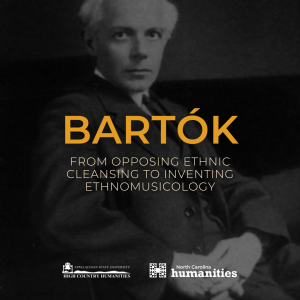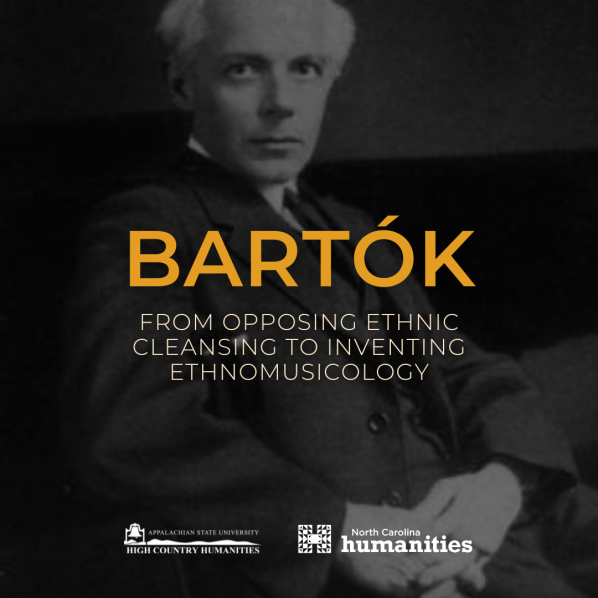“Bartók: From Opposing Ethnic Cleansing to Inventing Ethnomusicology”
Tuesday, March 4, 2025, from 5:30-7 p.m.
Turchin Center for the Visual Arts, Room 1102
[Add to Google Calendar] [View on Engage]
BOONE, N.C. — Appalachian State University's High Country Humanities—with support from North Carolina Humanities—is pleased to present “Bartók: From Opposing Ethnic Cleansing to Inventing Ethnomusicology” on Tuesday, March 4, 2025, from 5:30-7 p.m. in Room 1102 of Turchin Center for the Visual Arts, located at 423 West King Street in Boone. Attendees may use the College Street Parking Deck next to the Belk Library and Information Commons free-of-charge from 5 p.m. until the end of the event.
The classical composer Béla Bartók is perhaps most famous in the music world for having incorporated elements of folk music into his work, a practice that earned him the title of “father of ethnomusicology.” However, attitudes of ethnic elitism in Occupied Europe made it difficult for his projects to flourish there. Bartók became an outspoken critic of antisemitic laws in Hungary and fled to the United States during World War II. This event presents two talks and a listening workshop that will help participants understand and appreciate the legacy of Bartók and other classical musicians who resisted antisemitism and fascism in the 1930s and 40s.
“Bartók: From Opposing Ethnic Cleansing to Inventing Ethnomusicology” will feature presentations by the following guest speakers:
Dr. Darci Gardner
Dr. Darci Gardner (she/her) is the director of High Country Humanities, an associate professor of French and Francophone studies in the Department of Languages, Literatures and Cultures and an affiliate faculty member in the gender, women’s and sexuality studies program in the Department of Interdisciplinary Studies. She holds a Ph.D. in French with a minor in Italian studies from Stanford University and a B.A. in comparative literature from Vanderbilt University. Her research centers on literature and the arts in late-nineteenth and twentieth-century France. Her publications include a book and several journal articles on Marie Krysinska, a Polish and French pianist, composer and author. She also teaches courses on representations of World War II and has given conference papers and invited talks on Jewish artists and authors. Her article “Simenon’s Criminals and Collaborators” addresses perceptions of identities in postwar France.
Ms. Amy Hudnall
Ms. Amy Hudnall (she/her) is the Assistant Director of Outreach and Public Relations for App State's Center for Judaic, Holocaust and Peace Studies (CJHPS) and a senior lecturer in the Department of History. She has published numerous articles and book chapters on genocide, trauma theory, perpetrators and cross-cultural conflict. In recognition of outstanding teaching and advising, Hudnall has been honored with the 2015 Wayne D. Duncan Faculty Enrichment and Teaching Fellowship for Outstanding Teaching in General Education, the 2023 Excellence in Academic Advising Award and the 2024 Richard N. Henson Outstanding Advisor Award. Hudnall has been involved in community programming through CJHPS since its inception over twenty years ago. She has served on numerous nonprofit boards and was the Executive Director of a nonprofit horse rescue, Horse Helpers of the High Country, for seventeen years.
Dr. Jacob Kopcienski
Dr. Jacob Kopcienski (he/they) is an assistant professor of musicology in App State's Hayes School of Music, as well as an affiliate of the Center for Appalachian Studies. He holds a Ph.D. in musicology from Ohio State University and an M.A. from West Virginia University. His research contextualizes LGBTQ music, cultural organizing and communities in Appalachia, the Midwest and the South. Dr. Kopcienski has published in the Journal of the Society for American Music, the Journal of Appalachian Studies and as a staff writer for the website I Care if You Listen. He leads community-engaged work at App State as the coordinator of the Music Humanities Community Conversation Series. Previously, he worked with the Ohio State Center for Folklore Studies, the Rendville Historic Preservation Society and Black in Appalachia in a multi-year partnership to document rural African American communities in Appalachian Ohio. He also holds a B.M. from Bowling Green State University and completed studies in saxophone at the Conservatoire à Rayonnement Régional de Boulogne-Billancourt in France.
This event is the first in a three-part series titled, “Bridging the Divide between Classical Music and Folk Traditions: Béla Bartók’s Legacy,” organized by High Country Humanities with the support of a grant from North Carolina Humanities. The event is free and open to the public.
For more information, visit hchumanities.appstate.edu or contact Dr. Darci Gardner, director of High Country Humanities, by email at gardnerdl1@appstate.edu or by phone at (828) 262-2928.
Related:
April 2: Pickin’ Apart Bartók: How to Hear Folk Sounds in Classical Music
May 4: Folk-Infused Classical Music: Listening Workshop and Concert
###
About High Country Humanities
High Country Humanities at Appalachian State University aims to foster a greater understanding and appreciation of the humanities across the High Country region of North Carolina. The program supports faculty in their scholarly activities, promotes their collaborations with community partners and organizes events that help their expertise reach the wider public. High Country Humanities is an initiative of App State’s College of Arts and Sciences, with support from the Division of Academic Affairs. Learn more at hchumanities.appstate.edu.

